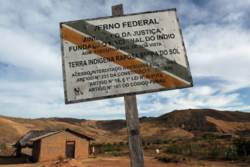
A sign that reads: "Federal government. Indigenous National Foundation. Indigenous Land Raposa do Sol." is seen at the Raposa Serra do Sol reservation, Roraima state, Brazil February 9, 2019. (Photo: REUTERS/Bruno Kelly)
Land seizures and COVID-19: the twin threats to Brazil’s indigenous peoples
By Richard Pearshouse, Amnesty International’s head of crisis and the environment, and Jurema Werneck, executive director of Amnesty International Brazil
As indigenous groups lock down in villages, trespassers are taking advantage of their absence to steal their land
Across Brazil, many Indigenous peoples have gone into voluntary isolation, barricading access roads to protect their villages from the COVID-19 pandemic. As one Indigenous nurse told recently Amnesty International by telephone: “I explain the importance of not leaving our villages. We are over 400 people in this Indigenous territory. If one person gets COVID-19, it can contaminate us all.”
Worries about the spread of the virus among Indigenous peoples have increased, as this week the first case among Brazil’s Indigenous peoples was confirmed: in Amazonas state, a 20-year-old Indigenous Kokama woman tested positive for the virus.
In Brazil, these fears have a long history. Epidemics of infectious diseases repeatedly hit Indigenous communities, the impacts worsened by the low standard of health services provided by the government. Amnesty International spoke recently to two health providers at Brazil’s Special Secretariat of Indigenous Health (SESAI).
What they described does not bode well for the weeks and months ahead: a lack of protective equipment and hand sanitizer among SESAI’s health workers, as well as general staff shortages from years of maintaining the agency on a shoe-string budget. The dire situation prompted the Coalition of the Indigenous Peoples of Brazil–APIB to demand that the government implement an Emergency Action Plan.
Even while the COVID-19 pandemic threatens the health of Indigenous peoples in Brazil’s Amazon, pressure over their traditional lands is increasing as grileiros –individuals who illegally seize land – sense an opportunity to exploit the crisis. Although it’s currently the rainy season in the Amazon (which runs from roughly October to May) many grileiros are active, plotting out lots and cutting access paths through the jungle.
Even before COVID-19, pressures on Brazil’s Amazon were increasing. Using satellite monitoring of deforestation, INPE (Brazil’s National Institute for Space Research) reported the loss of 469 km² in the Amazon in the first two months of 2020 - up 71.2% over the same period in 2019.
One of the unavoidable effects of voluntary ‘lockdowns’ in Indigenous villages is a reduction of their ability to patrol their territories. A Manoki Indigenous leader in Mato Grosso state told Amnesty International that patrols conducted jointly with IBAMA (the Brazilian Institute of Environment and Renewable Natural Resources) in February 2020 had found new paths into their territory and signs recently put up by grileiros to mark out new plots of land. He added “now we have suspended our monitoring. We had one inspection planned for April but we cancelled."
Brazil’s decree that environmental protection is an “essential service” during the pandemic exists only on paper. In practice, under the current circumstances environmental authorities have less capacity to implement their enforcement role. For example, a FUNAI (National Indian Foundation – the state agency that oversees land demarcation and other issues relating to Indigenous peoples) officer in Pará state who spoke to Amnesty International on condition of anonymity said that at least one key protection base in the region of Altamira was down to two staff instead of the usual four.
According to a recent estimate published by Reuters, roughly one-third of IBAMA’s field operatives won’t go to the field because they are over 60 or have pre-existing medical conditions that put them at greater risk from the virus. Field inspection staff are further hampered by logistical difficulties caused by fewer flights and closures of hotels and restaurants.
These impediments follow on from a year in which the Bolsonaro administration undermined Brazil’s system of inspecting and monitoring protected areas. There have been changes of key personnel: in one particularly worrying move, a former missionary was recently appointed to be the head of FUNAI’s department for isolated and recently contacted tribes.
During 2019, budgets were slashed, patrols reduced. The number of environmental fines levied by IBAMA in 2019 fell by 34% over 2018. Correspondingly, as documented Amnesty International in November 2019, some cattle farmers and grileiros have intensified their efforts to illegally seize protected land to graze cattle there.
The few government officials remaining on the front lines are extremely worried. An environmental agent responsible for a national park in Rondônia state, and who spoke to Amnesty International on condition of anonymity, told us they had received information that “invaders intend to take advantage of the situation (of the pandemic) to invade this week.” Another FUNAI official who covers an Indigenous territory in Rondônia state said that “organized crime will take advantage of the state’s fragility during the pandemic to attack and destroy the protected areas.”
COVID-19 – and the economic slow-down that may follow – means Brazil’s government needs to do more, not less, to protect Indigenous peoples and the Amazon. Brazil should ensure Indigenous peoples have equal access to health care and protective measures in the context of the COVID-19 pandemic.
As a matter of urgency, Brazil also needs to step up monitoring and patrols of Indigenous territories and environmentally protected areas in the Amazon region, while taking all measures to ensure the safety of government officers. In the months ahead, Brazil needs to strengthen Indigenous and environmental protection agencies, including with financial and human resources. Authorities should ensure the current health crisis will not be an opportunity for grileiros to destroy the Amazon forest.












